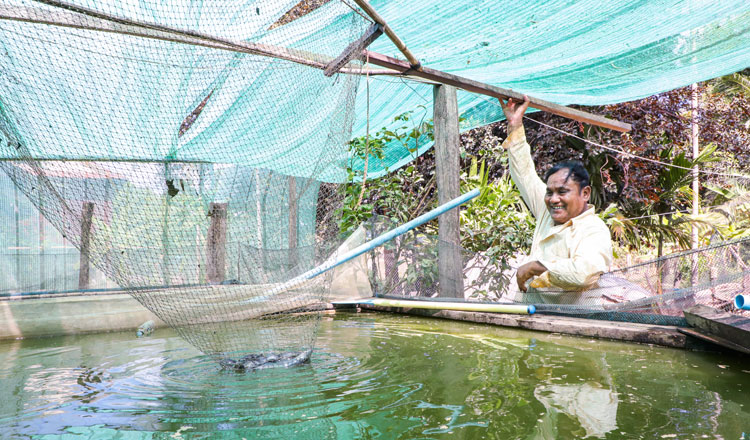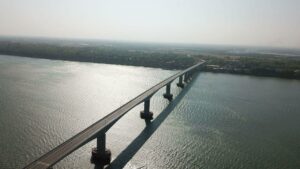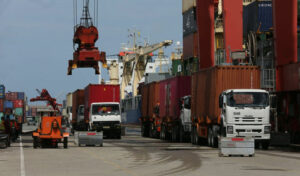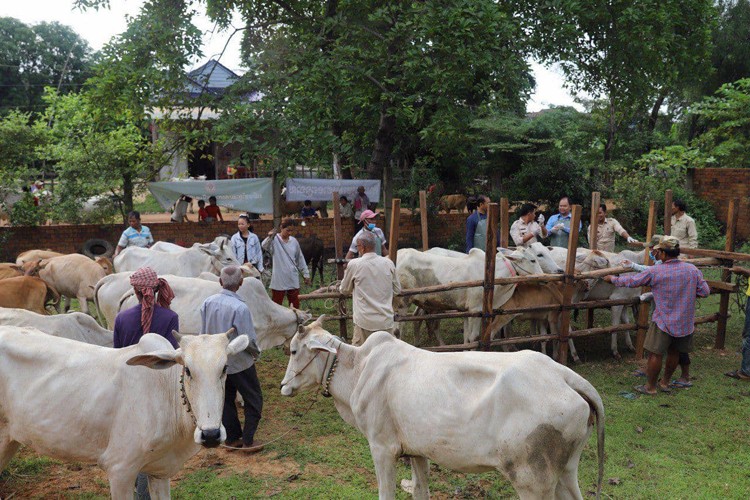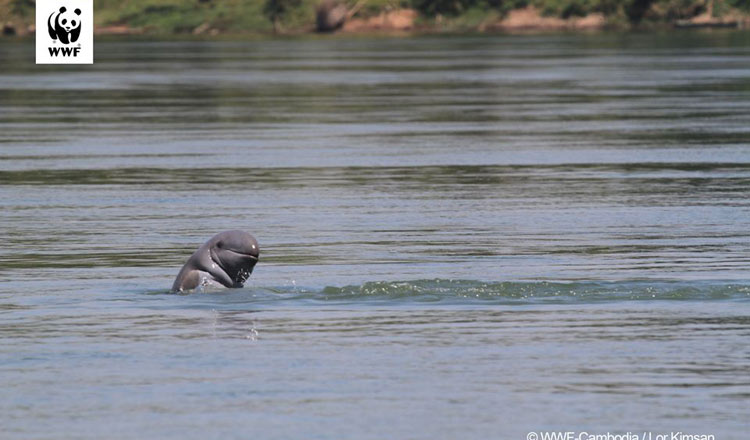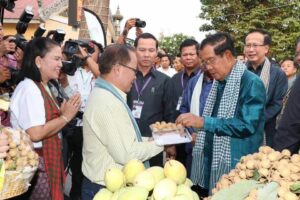Kratie’s fishing communities change focus after COVID-19
Fishing communities along the Mekong River who lost their jobs returned to relying on fishing in the hope of securing their livelihoods during the pandemic but face a recent decline in catches.
In Sophea, 46, a fish seller in Anlung Preah Kor villager in Sambo district, Kratie province, who buys fish from other villagers to resell to make marginal profits, said, “Nowadays, mostly I can only buy raised fish from my villagers while fish caught from the river are becoming fewer,” he said.
Prem Sam Ath, 52, a fisherman living along the Mekong River since 1993 in Vattanac village, Vattanac commune, Sambo district, Kratie province, commented: “Fish are scarce this year. In the past, there used to be many fish and I used to catch, by casting a fishing net, big fish such as black sharkminnow up to 30 or 40 kilogrammes a day. Nowadays, I can hardly catch even two or three of them per day.”
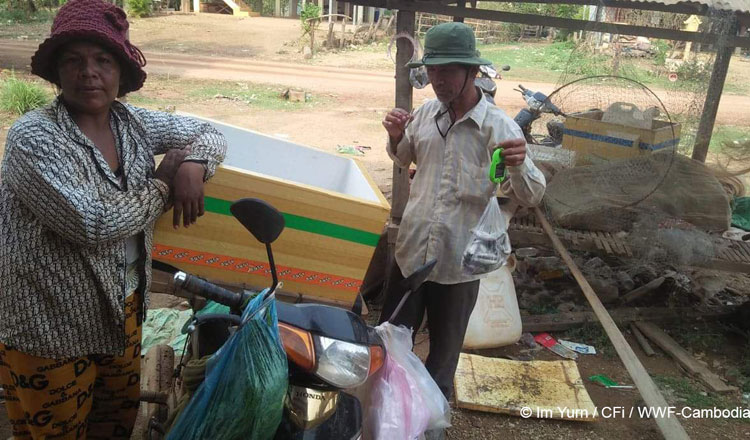
The Ministry of Agriculture reported that household fisheries production dropped 18 percent from 326,500 tonnes in 2019 to 268,000 tonnes in 2020. Meanwhile, household fisheries production in Kratie province declined 29 percent from 6,200 tonnes in 2019 to 4,385 tonnes in 2020, accordingly to annual reports of the Fisheries Administration Cantonment of the Provincial Department of Agriculture, Forestry and Fisheries in Kratie province.
Further to the decline, 16 conservation organisations around the world claimed in a report on World’s Forgotten Fish that populations of migratory freshwater fish have fallen by 76 percent since 1970 and mega-fish by 94 percent. The report says the reasons for the decline are overfishing and destructive fishing practices, habitat destruction, hydropower dams on free-flowing rivers, over-abstraction of water for irrigation and domestic, agricultural, and industrial pollution.
Losing their jobs after the COVID-19 crisis struck, a number of people from Kratie’s fishing communities had no choice other than to return home to their fishing community with the hope to earn a living by taking up fishing in the Mekong. Contrary to their expectations, fishing has not helped to relieve their current difficulties because the number of Mekong fish has declined.
WWF-Cambodia’s community livelihoods developed a project called “Improving food and income security of local people along the Mekong River” funded by the Government of Germany (BMZ). Through this, WWF-Cambodia is working collaboratively with the Fisheries Administration Cantonment of the Kratie Provincial Department of Agriculture, Forestry and Fisheries and local authorities in Sambo district to support 22 community households in Sambo to start fish farming in ponds in order to help improve the livelihoods of the communities while also encouraging them in the conservation of natural resources, especially the Mekong’s fishery resources.
Mok Ponlok, director of the Fisheries Administration Cantonment of the Provincial Department of Agriculture, Forestry and Fisheries in Kratie province said: “As people in the communities faced such struggles, WWF-Cambodia worked collaboratively with officials from the Fisheries Administration Cantonment to introduce sustainable fish farming practices to the local communities by providing the community members with fish farming techniques, fingerlings and ponds to start fish farming so that they could improve their livelihoods while reducing illegal fishing activities.”
Sin Song, chief of Vattanac Community Fishery in Vattanac village, Vattanac commune, Sambo district, Kratie province, quit river fishing to start fish farming. He said; “The fish in the Mekong River around here became so scant that I could not earn a living by fishing anymore. The people in my neighbourhood never practised fish farming before and they only went fishing in the river. But when the WWF came to provide skill training on how to farm fish, they started to [do it].”
Im Yun, 64, a former fisherman in Anlong Preah Ko village, Vattanak commune, Sambo district, Kratie province, started fish farming about two years ago. Unlike others whose livelihoods have been severely affected by COVID-19 coupled with the Mekong’s fish decline, Yun claimed the livelihoods of his family did not suffer. He said, “I have farmed fish in the ponds at my home, so at least I have my own fish for food and I can also earn some income from selling my fish,” he said.
According to Livelihoods and Ecotourism Officer of WWF-Cambodia Pha Nem, based in the Mekong Flooded Forest Landscape, farmers supported by this BMZ-funded project since 2019 can earn an average of $141 every three-month cycle by farming catfish.
She said: “Some people in the fishing community in Sambo district earn a living by totally depending on natural resources such as fishing in the river, but the fishery resources of the Mekong River are under pressure by illegal fishing and could become completely depleted in the near future. Therefore, what we can do is to help them adopt new jobs that are sustainable and do not affect natural resources. While we are helping them to improve their livelihoods, we can also help them understand better about the importance of conservation and encourage them to protect the natural resources.”
Song, also a fish farmer, had remarkable success with his fish farming. He joined WWF-Cambodia, the Kratie Fisheries Administration Cantonment and local authorities to help protect natural resources as well as joining patrols in the conservation areas along the Mekong River to stop illegal fishing and save the remaining Irrawaddy dolphins.
In 2020, community patrol teams of 10 community fisheries in Kratie, supported by WWF-Cambodia, conducted a total of 478 patrols in the dolphin conservation areas of the Mekong, stopped 166 illegal fishing cases including 109 cases of illegal use of gillnets and 57 cases of electrofishing. The community patrol teams confiscated a total of 9,090 metres of gillnets, four electrofishing gears and three illegal fishing boats. In addition, they also educated 570 fishermen on the fishery law of Cambodia.
For Sophea, fish farming has helped relieve the burden and reduce the risks to his family’s health and livelihood. He added: “Without the WWF’s supported fish farming, I and my children wouldn’t have anything to eat. Nowadays, I am less concerned because I have my own raised fish for food and for selling for some income.”
Besides supporting the communities with fish farming, WWF-Cambodia has also been supporting 511 families with a total of 2,760 members (1,518 women) in Kratie province to adopt sustainable jobs such as chicken farming, vegetable farming, raising cows and buffalos, processing non-timber forest products (rattan and wild honey) and community-based ecotourism programmes to improve community livelihoods and prevent the destruction of natural resources. In 2020, those families earned an average of $192 a month. Khmer Times

